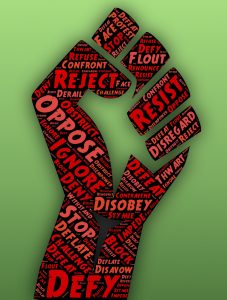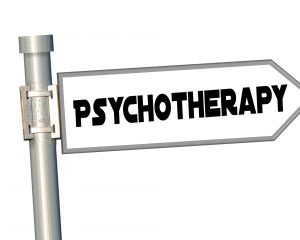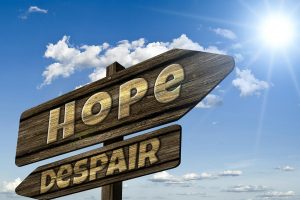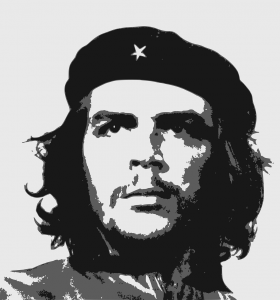

Contemplating that question, some people might well ask, why not both, or even, are they not interconnected? Here I shall be arguing that they are incompatible, that Socialism is an inadequate solution to the problems of the world, and that what is needed is a more spiritual approach.
All spirituality (and therefore all true religion) is about the transformation of consciousness. You could therefore also say that it is about the transformation of human nature. Here are some relevant statements by significant spiritual figures to give a flavour of this way of thinking:
The late Sir George Trevelyan, founder of the Wrekin Trust, which is concerned with the “Spiritual Nature of Man and the Universe”, was the author of A Vision of the Aquarian Age: The Emerging Spiritual World View (1), which is an important contribution to changing the world from a spiritual perspective. His associate Malcolm Lazarus says of him: “George Trevelyan was fond of saying that political change only scraped the surface and that the only change of real value was an inner willed change in consciousness” (2).
Arthur M. Young says in his important book The Reflexive Universe: “It is the self, and not the state, that is evolving”. “Individuation is itself but one part of a more comprehensive process in which a transcendent goal is attained. The goal is to reach a higher development than present man” (3).
Stephan Hoeller, modern Gnostic bishop and important commentator on Carl Jung, said: “Gnostics, like psychologists, do not aim at the transformation of the world but at the transformation of the mind, with its natural consequence – a changed attitude towards the world” (4).
Something else which springs to mind is a popular saying going back many years which says something along the lines of: “Let the world change, and let it start with me”.
According to the metaphysics of evolutionary panentheism, the idea which I think most accurately describes the nature of the world (5), if the material universe, which includes our political systems, is a manifestation of the evolution of divine consciousness, and of the current state of consciousness, then the only way that society can be changed is by the transformation of consciousness.
The question is therefore, why might people inspired by a spiritual perspective reject Socialism as a philosophy, as a means of changing the world? In the light of the above, the first thing to say is that Socialists are not trying to change their own nature, rather external society and its organisation. Do they have an adequate understanding of psychology and spiritual ideas? They don’t have to be, but tend to be atheists, which suggests that their appreciation of the latter will be very limited. I especially suspect that Socialists have a very limited understanding of what psychotherapists call projection, which means to see in the outside world something which is actually inner. The most commonly described example is to have a strong reaction to someone else, to dislike them for some personality trait. This turns out to be part of the person’s own character, which their ego-consciousness rejects (in the language of psychotherapy, represses). This is closely related to what Carl Jung calls the Shadow.

Socialists are obsessed with the greedy bankers and the rich. In their own eyes, they are clean and good, Robin Hood figures “robbing” the rich to give to the poor. Yet, according to the theory of projection, this suggests merely that they are repressing, are therefore unaware of, their own greed. From a spiritual point of view, the repressed greed remains part of the total contents of the psyche, and has no possibility of redemption or transformation because it remains unconscious.
The subject of projection was something that Jesus seemed especially concerned about in the Gospels. In Matthew 7, vv3-5 (6), he says: “Why do you see the speck in your neighbour’s eye, but do not notice the log in your own eye? Or how can you say to your neighbour, ‘Let me take the speck out of your eye’, while the log is in your own eye? You hypocrite, first take the log out of your own eye, and then you will see clearly to take the speck out of your neighbour’s eye”. In the Sermon on the Mount he said “strive first for the kingdom of God” (Matthew 6:33). Again in Luke’s gospel he said: “Strive for (God’s) kingdom” (12:31), later clarifying “the kingdom of God is among you”, an alternative translation for which is “the kingdom of God is within you” (17:20). So it seems that he was strongly suggesting that humanity’s main task should be to attempt transformation of their own inner world, to focus on the spiritual journey.
There is also an interesting parable in Luke’s gospel, in which Jesus criticises a Pharisee who is praising himself for his good works. He contrasts him with a tax-collector who was “beating his breast and saying, ‘God, be merciful to me, a sinner!’ I tell you, this man went down to his home justified rather than the other; for all who exalt themselves will be humbled, but all who humble themselves will be exalted” (18:10-14). This parable is addressed to those who “trusted in themselves that they were righteous and regarded others with contempt” (v9). Jesus was suggesting that we should work on the failings of our own nature. Of course, in order to do this, we have first to be aware of them, and not repress them.
A good modern example of someone who trusts in himself that he is righteous is Jeremy Corbyn (7). We are constantly reminded by his followers that he is thoroughly “decent”, a “man of principle”. He gives all the appearance of a secular saint; he is a pacifist, a vegetarian flirting with veganism, thus making sure that no animal can be harmed by his eating habits, has dedicated his life to standing up for the poor, the downtrodden of society. Sounds great, doesn’t it?
I’ll take a brief look at his rise to prominence. He could easily never have become leader. All prospective candidates needed a certain number of nominations from sitting Labour members of Parliament. The only reason he received just enough votes was because certain members, although they did not want him as leader, generously decided that it would be a good idea to have as wide a debate as possible within the Party, and therefore nominated this far-left (within the Labour world) candidate. One of those members, Margaret Beckett, is on record as saying that this was the worst mistake of her political life, and agreed that she was a “moron” (!) for doing so. The election which followed operated under different rules from previous ones, the previous leader, Ed Miliband, having decided to change the system to one-member one-vote. This meant that ordinary members had a much greater influence than previously, and because the activists are generally further to the left than the Parliamentary Party, Jeremy Corbyn was duly elected.
Has he rewarded the generosity of his fellow MPs? The Labour Party is said to be “a broad Church”. Admittedly, he is in a difficult position, in that many of them refused to serve in his Shadow Cabinet, and several others have subsequently resigned. However, under his leadership, the pro-Corbyn organisation Momentum is now widely reported in the media to be seeking to deselect moderate (Blairite) MPs, and taking steps to ensure that Corbyn’s successor will be somebody in his image.
You may think that this is just how normal politics works, but it is a symptom of something more sinister. Following Corbyn’s election, there was a surge in Labour Party membership, which was attributed to his appeal and popularity. There was some truth in this, but does not give the full picture. In the 1980s Neil Kinnock, the former Labour leader, had a hard time and had to spend much energy in expelling from the party an organisation known as the Militant Tendency, an assortment of non-democratic and revolutionary members (the clue is in the name). It seems that some of these new members were those who had previously been expelled (and presumably younger persons of a similar mindset). This is commonly called entryism. The consequence is that the supposedly democratic Labour Party can be manipulated by those who have no interest in its agenda. The deputy leader Tom Watson, obviously concerned, courageously reported this in the media – and it seems unlikely that he would do this, unless he were sure of his facts. He specifically said that Corbyn was aware of the entryism, and asked him to confirm that such people should not be allowed to be members of the Labour Party, since they were proscribed by party conference while Neil Kinnock was leader. He also passed on a document, which he claimed was being circulated amongst Momentum members, explaining their tactics for taking over the party. How did the leadership respond? Both Corbyn and Shadow Chancellor John McDonnell appeared on television denying the entryism, and Tom Watson was accused by spokespeople for the party of peddling conspiracy theories (8). The reasonable conclusion is that Corbyn and McDonnell do not care who is in the party, are willing to accept militant revolutionaries, as long as it helps them get to power.


There is a well-known saying “All power corrupts and absolute power corrupts absolutely”, and history provides us with many examples. Socialism/ Communism begins as an idealistic attempt to “liberate the Proletariat” from the oppressors, whoever they may be, to solve the problems of working-class people. How does this often end up? These same leaders frequently turn into despots, often murderous. Opposition is suppressed, sometimes brutally, as are freedom of speech and human rights.
There has been a recent outstanding and revealing example, President Robert Mugabe of Zimbabwe. His original purpose was to free the black population from the oppressive white rulers. When he was recently removed from office, the “liberated” black population were dancing in the streets in an orgy of celebration. Why might that be? Some possible reasons are: his institution of a one-party state, suppression of dissent, his accumulation of massive personal wealth (which often hints at corruption), and his attempt to have his wife become his successor, which sounds like something that Socialists/Communists are meant to hate (inauguration of dynasty, bloodline succession in the tradition of monarchies).
Similar behaviour, probably even worse, can be seen in other Socialist/Communist societies. There is the phenomenon of the USSR and other East European countries, before the collapse of Communism. It began with a wave of optimism at the time of the Russian Revolution, but ended up with the murder of their own citizens (Stalin), appalling suppression of dissent and human rights (secret police organisations, labour camps), and so on. One is tempted to ask whether these societies have become as bad, if not worse, than the systems they replaced. All these revolutionary leaders may start off as idealists, but having acquired power, the slippery slope begins. It is reasonable to ask whether they were merely projecting their own dark side onto their perceived oppressors?
 (He looks really friendly, doesn’t he?)
(He looks really friendly, doesn’t he?)
The worst example of such a country in present times seems to be North Korea, officially known as the Democratic(!) People’s Republic of Korea. This title seems to be somewhat ironic, given that it has become a Socialist equivalent of a hereditary monarchy, the current leader Kim Jong-un having replaced his father Kim Jong-il, who in turn had replaced his own father Kim Il-sung. What life is like there is revealed in a book by a defector Yeonmi Park, called In Order to Live (9), which also featured as BBC radio 4’s Book of the Week (10). All life there is tightly controlled. At school she was taught never to express her opinion, never to question anything, to do what the government told her to do, that the leader could read her mind, and that she would be punished for any bad thoughts. There were spies everywhere, listening and watching, and everyone was ordered to inform on anyone suspicious. All foreign journalists were banned, and televisions adjusted to only approved channels. There was obviously much propaganda – citizens were taught to think with one mind, and to hate the enemies of the State with a burning passion, which included stabbing dummies of American soldiers.
How can it be, that such Socialist/Communist idealists turn out to be appalling despots? I don’t think that evil is too strong a word for some of their behaviour. (This is presumably why in the gospels, Jesus had to overcome the temptation of Satan, the Devil representing the tendency towards corruption in positions of power.) The obvious explanation is that they are unaware of the dark, shadow side of their own nature, most obviously their latent, unconscious, power complex, including the willingness to kill and persecute their own citizens, but also the possibility of the accumulation of wealth, thus greed. Western (Capitalist) societies seem to avoid this by having an extensive system of limitation (checks and balances) on the Executive, and by being democratic; the outcomes described above are much more likely in one-party systems. This is, of course, not to say that they are perfect, since they also sometimes behave very badly, somewhat along the lines of their Communist counterparts; it is all a matter of degree.
Am I suggesting that something similar might happen should Corbyn come to power? No, but embryonic tendencies in that direction are already apparent: attempts to remove opponents, suppression of debate, willingness to tolerate militant entryists (11), and denial that they are doing any of this. Who knows how much worse this will become, should they ever be elected?
There is much more that could be said about the psychology of Socialism, but this article is already long enough. So I hope to return to the subject later, and in the meantime I’ll leave you with these words of profound wisdom from Carl Jung:
“All such attempts (to improve society) have proved singularly ineffective, and will do so as long as we try to convince ourselves and the world that it is only they (i.e., our opponents) who are wrong. It would be much more to the point for us to make a serious attempt to recognize our own shadow and its nefarious doings. If we could see our shadow (the dark side of our nature), we should be immune to any moral and mental infection and insinuation. As matters now stand, we lay ourselves open to every infection, because we are really doing practically the same thing as they. Only we have the additional disadvantage that we neither see nor want to understand what we ourselves are doing, under the cover of good manners.
The communist world, it may be noted, has one big myth (which we call an illusion, in the vain hope that our superior judgment will make it disappear). It is the time-hallowed archetypal dream of a Golden Age (or Paradise), where everything is provided in abundance for everyone, and a great, just, and wise chief rules over a human kindergarten. This powerful archetype in its infantile form has gripped them, but it will never disappear from the world at the mere sight of our superior points of view. We even support it by our own childishness, for our Western civilization is in the grip of the same mythology. Unconsciously, we cherish the same prejudices, hopes, and expectations. We too believe in the welfare state, in universal peace, in the equality of man, in his eternal human rights, in justice, truth, and (do not say it too loudly) in the Kingdom of God on Earth” (12).

I hope that in these words you recognise that the Socialist vision is an illusion. In Jungian language the consciousness of Socialists is in the grip of an archetypal idea, which is unrealisable, at least from a Socialist agenda. Let us therefore put it behind us, and try to find ways of bringing down, through a spiritual process, the true Kingdom of God on Earth, the Socialist version of which is a mere caricature.
Footnotes:
(1) Coventure Ltd., 1977. Also Gateway Books, 1994
(2) David Lorimer (ed.), The Spirit of Science, Floris Books, Preface p9
(3) Robert Briggs Associates, 1976, pp182-183
(4) The Gnostic Jung and the Seven Sermons to the Dead, The Theosophical Publishing House (Quest), 1982, p14
(5) This is a concept developed by Edward Kelly and his co-authors in their two very important books Irreducible Mind, 2007, also Rowman & Littlefield, 2010, and Beyond Physicalism, Rowman & Littlefield, 2015.
(6) All gospel quotes are from the NRSV translation.
(7) I trust that all British readers will know the name. For the benefit of others, he is the current leader of the Labour Party in Britain, and has moved the party significantly to the Socialist left.
(8) For more details, see http://www.bbc.co.uk/news/uk-politics-37039222 and https://www.theguardian.com/politics/2016/aug/09/trotskyists-young-labour-members-jeremy-corbyn-tom-watson.
(9) Penguin, 2015
(10) October 26-30, 2015
(11) While Corbyn has continued to speak in his saintly manner, moderate MPs in the 2017 election were subjected to appalling abuse, including having bricks thrown through the windows of their constituency offices. At the following Labour Party conference, the BBC journalist Laura Kuenssberg had to employ security guards as protection, such were the perceived threats. Jeremy Corbyn, of course, consistently condemned such behaviour. Perhaps he should consider more closely whom he allows into the party.
(12) Man and His Symbols, Picador, 1978, pp73-75